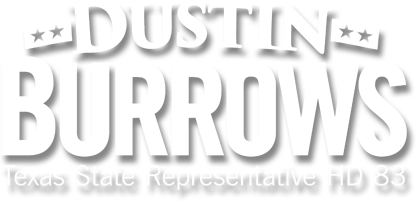Smaller school districts in Texas are pushing lawmakers to alter a piece of the way the Lone Star State funds schools. Some districts including, Slaton Independent District, believe that the public school funding model penalizes them just for being smaller districts, putting their students at a disadvantage. It appears at least one Texas legislator has heard their frustration: State Representative Dustin Burrows (District 83) filed a bill Monday to remove those penalties.
He explained that the laws which established the penalties were enacted in the 1980’s in an effort to consolidate school districts.
“A lot of people wanted to try to force some of these districts into consolidation, it was probably a lot of members who probably don’t live in these districts and don’t understand and appreciate how great of a job these rural school districts do in educating our kids,” Burrows explained.
He’s been involved with efforts in the past to try changing this policy. His focus is not on altering the way that Texas schools are funded, but rather on getting rid of the “adjustment” which requires that small school districts of less than 300 square miles receive less state funding. The penalty started off as a 25% adjustment, Burrows said, currently the adjustment is up to over 37%.
“It hurts our small rural schools at the end of the day, it’s something I hope we can fix this upcoming session,” Burrows said.
He believes his bill will do away with an outdated, punitive adjustment.
Burrows said that many small rural school districts have come forward to ask for his help in changing this policy, including Slaton ISD.
This is far from the first time that Texas Public schools have opposed the state funding system. Over 600 Texas schools sued in opposition of state funding, but the Texas Supreme Court upheld the funding policies.
“Our Byzantine school funding ‘system’ is undeniably imperfect, with immense room for improvement. But it satisfies minimum constitutional requirements,” Justice Don Willett wrote in the opinion.
Julee Becker, superintendent of Slaton ISD said that this lack of funding is the biggest challenge facing her district. While her district has made huge strides in standardized testing, school programming, and other areas, the penalty prevents them from retaining their teachers.
“The reason that impacts us is that we have very good teachers, but if you have a teacher who is offered a job for seven, eight, or ten thousand dollars more in another district, it’s not that they don’t care about your kids or your town, it’s that they gotta make a better life for their families,” Becker said.
She added that one in every three or four teachers in her district will end up moving on to other jobs. That means the school districts lose out on resources they invested in those teachers who move on, and students lose out on consistency in the classroom.
The base salary for a Slaton ISD teacher is $32,000 annually, the base salary for a teacher in nearby Lubbock ISD is $43,000.
“If the state wanted us to consolidate, I feel like they should say that we should consolidate instead of trying to punish us by being in smaller communities,” Becker said. “We are the heart beat of Texas, there are more rural communities and more small school districts than there are any other school districts.”
Becker believes that the bill Burrows has filed would change all that.
Becker said that data from the Equity Center, a school finance research and advocacy organization, suggests that reversing this penalty would give Slaton ISD enough money to offer salaries to teachers that would be competitive with nearby schools.
Numbers from Equity Center also suggest that reversing this penalty would put thousands of dollars back into school districts annually: $808,724 for Idalou ISD, $747,612 for New Deal ISD, $837,694 for Roosevelt ISD, and $820,766 for Slaton ISD.
Bills like the one Burrows has filed have been pushed through the legislature in the past, but they’ve faced some opposition.
“At the end of the day this bill has been filed by a lot of other members over a long period of time and we have not had a lot of success getting it passed,” Burrows said. “I feel like this session we need to take a hard look at school funding and I hope this is a cornerstone of re-reading the formulas.”
Burrows staff said this bill will have a modest impact on the budget, but it’s too early to know the exact numbers.
Becker plans on meeting with other educators in Region 17 to explain their concerns about the state funding penalty to State Representative Charles Perry.
“I think that it’s gonna take all of us to make a difference with this,” Becker said. “Legislators do listen to educators, but they really listen to parents and to school board members and to citizens, If citizens want a level playing field for our small rural schools, then they need to let their legislators know, whoever their legislators are.”
Watch the full interview here: http://www.everythinglubbock.com/news/kamc-news/texas-reps-bill-takes-aim-at-funding-penalties-for-small-school-districts/619109909

